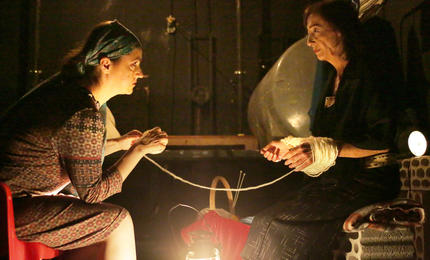Abou Warde El-Santa: Rewriting History
Aliya Khalidi attempts to reconstruct the collective memory of the Lebanese war in a brutally immersive play.

Divided into four groups, the audience followed the stories of four characters attempting to reconstruct their memories of the war. (Photo courtesy of Samer Beyhum)
The audience was asked to break up into four groups, each according to the color of their tickets for LAU’s major theater production Abou Warde El-Santa, directed by Theater Lecturer Aliya Khalidi. Baffled, each group of 20 people was led on separate routes into the Safadi Fine Arts Building, while being assured that they could leave at any time if the experience became too intense. With that, they left behind a familiar world to be immersed into one from another time ― the Lebanese civil war.
Once in the Fine Arts Building, the groups followed the stories of four characters in their attempt to reconstruct their memories of the war, which lasted from 1975 until 1990.
Khalidi, who holds a PhD in Arabic Theater, based the play on two works by late Egyptian writer Alfred Farag, and co-wrote the script with LAU alumna and dramatist Hiba Sleiman with input from Technical Director and alumnus Anas Ghaibeh. She said she got the idea after going through her own journals from the time, and discovering that she had major gaps in her memory. She was also perturbed by how little her students knew about that period of Lebanon’s history.
“Why hasn’t the government written this history? Because nobody has agreed on one history,” she said. This disagreement inspired the idea of separating the audience into groups. “What I decided was to bring in people from four different entrances to the building, and have each one of them go on a different trajectory, while watching the same things,” she added.
Khalidi hoped that, by witnessing identical events from various angles, the audience would notice different details. “The events during the Lebanese war were the same for everyone, but what we are stuck on is the angle from which we view the war,” she said.
She also went as far as separating people who came together in order to allow for more dynamic conversation after the play.
After passing through four checkpoints, visiting a morgue, watching children pass the time in underground shelters and meeting an agitated bomb maker, the four groups reunited in what was meant to be a graveyard. On the seats were the names of all the massacres that had taken place during the war, as stills from the war were projected above the stage.
Zalfa Halabi, a 25-year-old art critic who was in the audience, said it was important “to shake people up a little bit, to talk about things that they don’t want to talk about. I think a lot of people around me were shaken in ways they should be.”
The last scene resonated the most with 60-year-old attendee Naeela Haddad. “I felt I was in the presence of all those who died,” she said, adding that the play reminded her that people in Syria and Iraq are now going through what the Lebanese experienced decades ago. “It’s like Russian roulette. Today is not our turn, but tomorrow it might be.”
School of Arts and Sciences Dean Nashat Mansour said that even though the play brought back bad memories, it was “proper to reinforce the lessons that we learned from that experience.”
Abou Warde El-Santa will be showing from December 1 to December 3 at 8:30 p.m. at the Safadi Fine Arts Building on the Beirut campus.
Communication Arts students at LAU express their pride in the department’s mission to #ReinventCommunication
Watch full video: http://comm.lau.edu.lb
More
Latest Stories
- Bolstering Cancer Care Through Psychology at LAU
- Alumni Solidarity and Support Dinner in London Gives Hope to LAU and Lebanon
- The LAU Genetics Team on a Discovery Streak
- In Loving Memory of LAU Student Mohamad Nasrallah
- Alumnus Hussein Freijeh: From Local to Global and the Lessons Learned in Between
- LAU’s Research Excellence Shines: 25 Faculty Members Ranked Among World’s Top Scientists
- Speaking Health to the Community
- How Can I Be Happy in These Trying Times?

